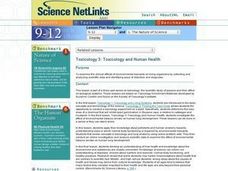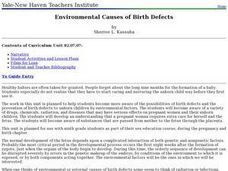Curated OER
Industrialization, Chemicals and Human Health - Math
Students review the units of the metric system, and practice estimating measures before actually converting between the two systems of measurement. They participate in activities to visualize a concentration of one part per million....
Curated OER
Pesticide Watch Card
Learners examine human health by identifying dangerous pesticides. For this agriculture lesson, students research the food production system in the United States and discuss dangers such as pesticides, chemicals and insecticides which...
National Library of Medicine
Your Environment, Your Health: Chemicals in Your Home
Many people know about chemical pollution, but are all chemicals bad? The third unit in a series of six addresses chemicals common in everyday life. Scholars learn about the chemicals found in their own homes, chemical safety, and...
Curated OER
Fertilizers, Pesticides and Human Health
Students define several vocabulary terms related to chemicals and toxicology. Students calculate chemical concentrations in water and explain the toxicological principles that govern safety of substances. Students conduct an...
Curated OER
Toxicology And Human Health
Students examine the clinical effects of environmental toxicants on living organisms by collecting and analyzing scientific data and identifying ways of detection and diagnosis.
Curated OER
Hazardous Chemicals in Your Neighborhood
Students examine the effect of hazardous chemicals on humans. They discover how the chemicals are cleaned up and the facilities in their neighborhood. They identify federal and local agencies that oversee environmental hazards
Baylor College
Neurotransmitters Contain Chemicals
Human body systems students play a card game, "Locks & Keys" in order to learn that neurotransmitters carry a message from one neuron to another by fitting into a receptor site on the receiving nerve cell. While this activity can...
Curated OER
Healthy Heart Parent Night
Students use a smoke analysis machine and create a visual display to show risks involved in smoking. For this cigarette smoking lesson, students demonstrate how to use a smoke analysis machine and show results in a visual display....
Curated OER
Organic Mechanic Part I
On day one of the "Organic Mechanic Part I" lesson, learners try to remove the waxy coating of an apple and consider pesticides that may be represented by this addition to our food. On day two, they research pesticides online and...
Curated OER
Three is a Toxic Number
Future public health advocates read a case study of a combination of water pollutants that may be linked to autism. The class is split into three groups, one to research each of the suspected chemicals. The look at how each one affects...
Curated OER
Health Benefits of Rice
Sixth graders examine the health benefits of rice. For this food benefits lesson, 6th graders discover the nutritious benefits of rice. Students research Celiac Sprue disease and how rice benefits the people with this disease.
Curated OER
What can I do?
Students identify feelings and explore positive ways to handle conflict. In this mental health lesson students discuss feelings and how to constructively handle them.
Curated OER
Essential Elements
A color-coded periodic table identifies organic elements, major minerals, and trace elements. Oxidation states are highlighted and types of chemical bonding are annotated. The electron energy level chart is explained. Though not all of...
Curated OER
Nervous System and Senses
In this health worksheet, learners complete the crossword puzzle based upon the theme of the nervous system and its interaction with the senses.
Curated OER
The Chemistry of Life
Students study atoms and chemical compounds. They identify certain elements essential to human health, describe physical and chemical properties of water, and name four types of polymers unique to all life forms. They explain how each...
Curated OER
Hazardous Chemicals? Not in my Water!
Students reflect on the effects of their actions on the environment. In this community service lesson, students investigate the hazardous quality of products within their homes. Student educate their families and communities about the...
Curated OER
ToxMystery Lesson Plan 2 : Case Book: Catch That Hazard!!!
Students explore toxic hazards. In this personal health lesson, students discover appropriate uses for household chemicals as they identify potentially harmful products in their homes.
Curated OER
Methamphetamine: A Threatening Scourge on Teens, Families, and Communities
Students examine how methamphetamine alters the brain and the facts about it. In this brain chemical addiction lesson students read articles on methamphetamine and take a quiz.
Curated OER
Human Body Digestion
In this health worksheet, students find the words that related to the concept of digestion. The answers are found at the bottom of the page.
Florida Department of Environmental Protection
Water's Journey Expedition
Step into a scientist's shoes to go online and discover the Florida Springs Expedition, and participate in two activities focusing on how humans impact the environment. The first activity asks scholars to summarize the six dispatches at...
Nuffield Foundation
Assessing Human Hearing
Young scientists explore hearing through multiple experiments, demonstrations, and activities. They focus on the changes in hearing over a lifetime, how we can determine where a sound is coming from, and the ability to filter noises.
Twin Cities Medical Society
Should I Talk to My Kids about Vaping?
Enlist parents and guardians in an anti-vaping campaign with an infographic that offers suggestions for how to talk with their students about e-cigarettes and e-liquids. The visual includes information about the dangers of vaping as well...
Curated OER
Environmental Causes of Birth Defects
Get your high schoolers thinking about the factors that lead to birth defects. They examine how environmental factors and personal choices can cause birth defects in unborn children. They discover the effects of various handicaps such as...
Curated OER
Which Side to Choose? An Exercise in Choices and Ethics
Students evaluate their reaction to a series of statements to investigate that personal choices are based on personal goals, peer and social pressures, ethic and religious beliefs, and the knowledge of biological consequences. This is...

























